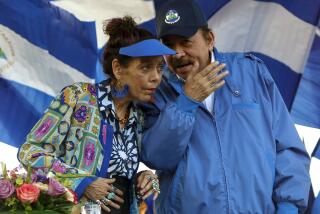Sandinistas Call Off Talks With Contras
SANTO DOMINGO, Dominican Republic â The first face-to-face talks between warring Nicaraguan factions were called off by the Sandinista government hours before they were to start here Monday after House Speaker Jim Wright declined to send four associates to take part.
The government urged the Texas Democrat last Friday to send the four Americans as a technical âsupport teamâ for Cardinal Miguel Obando y Bravo, the Nicaraguan mediator in the Sandinistasâ war with U.S.-backed Contras.
Wilson Morris, an aide to the Speaker and one of the four, said in Washington that the governmentâs suggestion was declined because it had not been seconded by Obando. He added: âAt no time did we think our participation would determine whether or not a meeting took place.â
Late Sunday, while a six-man Contra delegation was en route to this Caribbean capital from Miami, the Sandinistas notified the cardinal that their negotiating team would not come as scheduled Monday.
Nicaraguan President Daniel Ortega said in Managua that the talks were âdelayedâ for lack of âtechnical helpâ for Obando on military aspects of a truce.
âWe are talking with the cardinal about a new meeting in which specialists would be involved to assist him,â Ortega said.
Although the cardinal is not known to be seeking advisers, Ortega said he felt âoptimisticâ that some could soon be provided. Nicaraguaâs ambassador to the Dominican Republic, Danilo Valle, said that the truce talks might be rescheduled late this week or early next.
Aristides Sanchez, a senior rebel leader, accused the Sandinistas of stalling. âThey just donât have the will to sit down with us face to face in a civilized way to settle this,â he said.
It was the second breakdown in the peace talks since Obando resolved a monthlong dispute over a site for them. An initial round of indirect talks, held through Obandoâs mediation here Dec. 3 and 4, ended in disagreement over political conditions for a truce.
Breakthrough Told
In his Sunday homily in Managua, Obando announced that he had achieved a breakthrough by getting both sides to agree to direct talks this week on the military details of a truce while continuing indirect negotiations on the political conditions for one.
He said he hoped to achieve a truce by Christmas.
Obando, who remained in Nicaragua on Monday, was not available for comment about the cancellation of the talks. But the chief rebel negotiator, Jaime Morales, who spoke with him by telephone, said that the cardinal sounded âsorrowful and annoyed.â
The issue of American involvement in peace negotiations has been a potentially disruptive one since the Sandinistas agreed to the talks last month.
Nicaraguan Foreign Minister Miguel dâEscoto first told Wright that Obando, as mediator, would need advice from American specialists on Central American and military affairs, and he asked Wright to suggest some.
The four associates Wright named last month were Paul C. Warnke, who was head of the Arms Control and Disarmament Agency under former President Jimmy Carter; Ed King, a retired colonel who has studied Central American armies; Richard Pena, who has worked with Wright on Central American issues; and Morris.
But Obando later told Wright he did not need outside advisers, the congressman said. Rebel leaders and aides to the cardinal have both said they oppose involvement by foreigners in the mediation effort. Obandoâs mediation team consists only of three other Nicaraguan church officials.
But Ortega has persisted in trying to bring the four Wright associates into the talks. Diplomats in Central America say that by getting the Speaker to take such a role in the peace process, Ortega believes he can head off congressional approval of new Contra aid.
More to Read
Sign up for Essential California
The most important California stories and recommendations in your inbox every morning.
You may occasionally receive promotional content from the Los Angeles Times.










